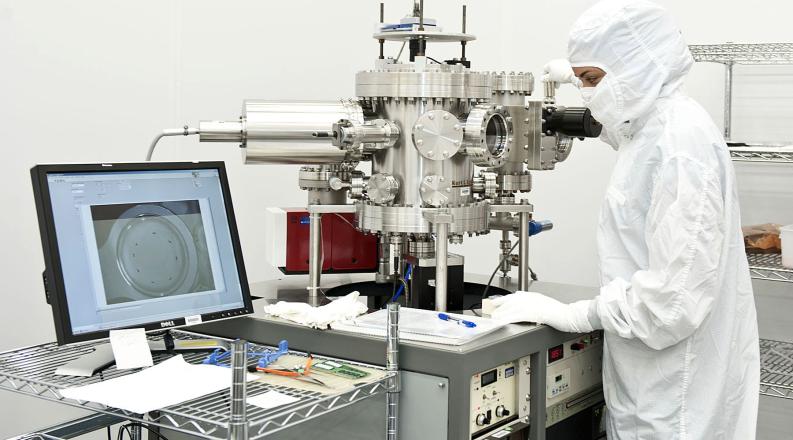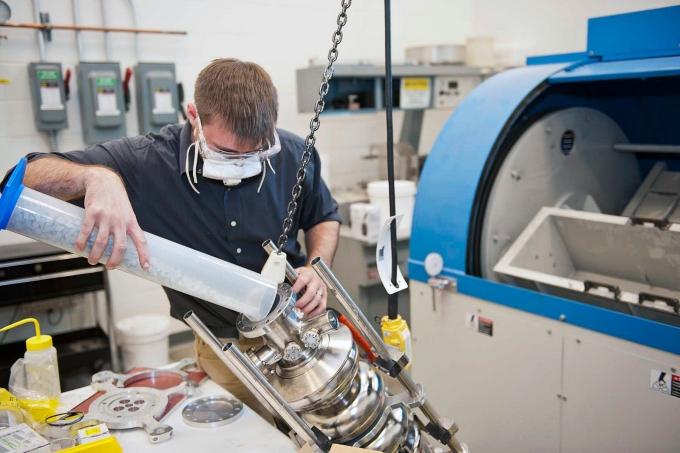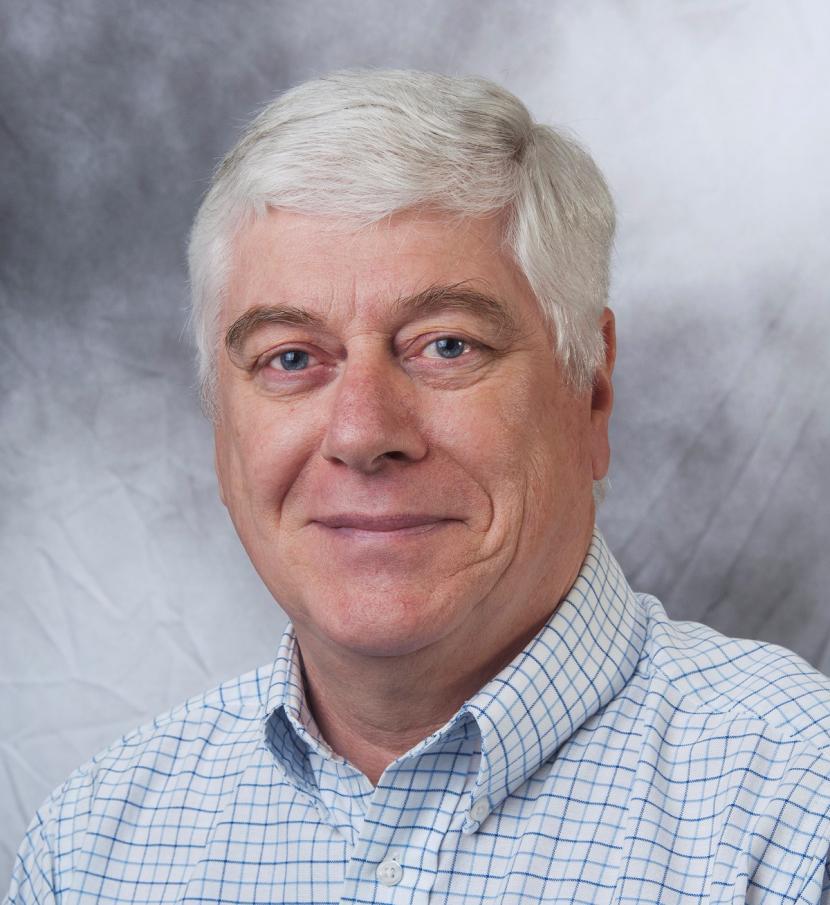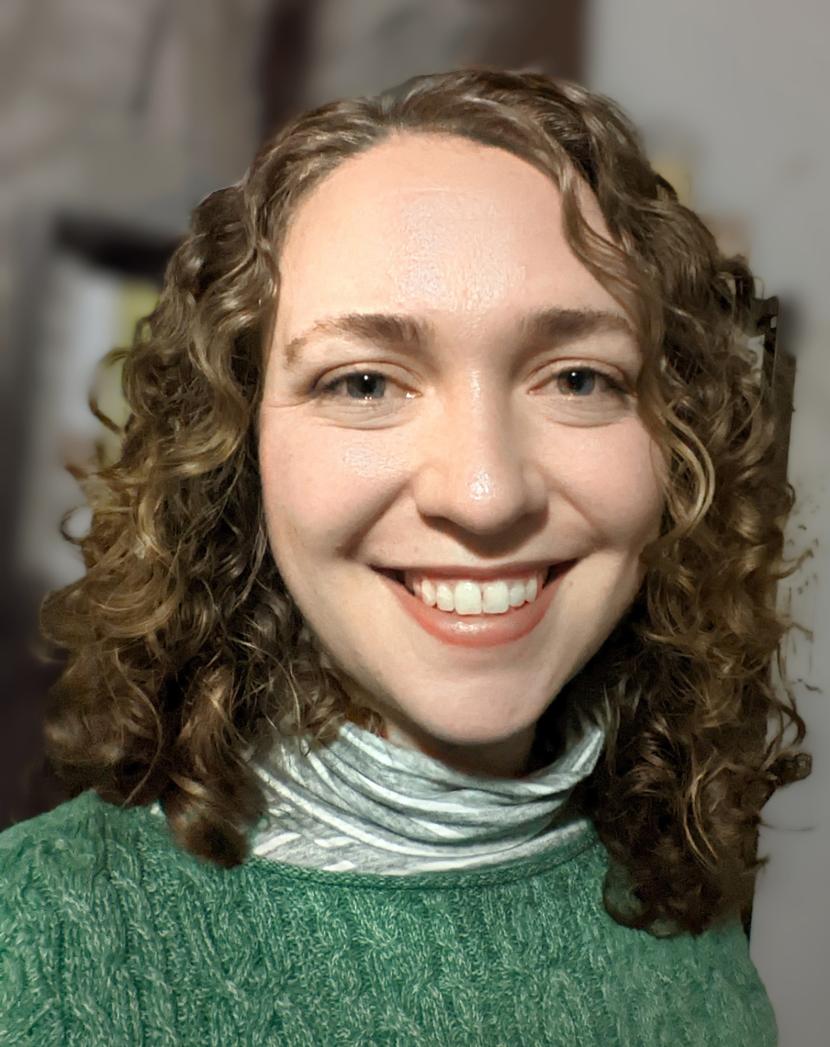Ari Palczewski performs accelerator science research at Jefferson Lab in this file photo, courtesy of Jefferson Lab.
By Tiffany Whitfield
The U.S. Department of Energy has funded joint traineeships designed to support graduate-level education at Old Dominion University in critical need areas of accelerator technology. The Virginia Innovative Traineeships in Accelerators (VITA) will support master's-level and early-year Ph.D. studies at ODU, Norfolk State University (NSU) and Hampton University (HU) in a wide range of accelerator physics and accelerator technology topics.
Jean Delayen, ODU professor of physics and director of the ODU Center for Accelerator Science, will serve as the principal investigator on this joint traineeship program. The co-principal investigators include: Khan Iftekharuddin, ODU professor of engineering and interim dean, Batten College of Engineering & Technology; Subashini De Silva, ODU Physics; Geoffrey Krafft, Jefferson Lab; Rasha Morsi, Norfolk State University; and Demetris Geddis, Hampton University.
This five-year $3 million grant will help address the need to train and hire qualified candidates in accelerator science and technology. Physics students at ODU and engineering students at ODU, NSU and HU will be offered two-year graduate fellowships leading to a master's degree or, for the first two years, leading to a Ph.D. at the universities.
"ODU is proud to serve as the largest academic research partner to JLab, where our faculty and students have been engaged in nuclear particle research that may unlock the mystery of how matter originated in the universe," said ODU President Brian O. Hemphill, Ph.D. "It is our honor to play a pivotal role, with our colleagues at Norfolk State University and Hampton University, in growing the pipeline of students who will become the next generation of leaders in particle accelerator research."
The traineeship will include summer internships at the Thomas Jefferson National Accelerator Facility (Jefferson Lab), where students can work with leading national scientists participating in global projects and on the CEBAF superconducting accelerator. Jefferson Lab has a long history of supporting graduate education in accelerator science and technology and a total of nine master's theses and 64 Ph.D. theses have been completed for work on accelerator science and technology at Jefferson Lab, beginning in 1994.
"With this joint traineeship program, we hope to get a bigger and better pool of students who can one day contribute to the Department of Energy workforce," Delayen said. "This program will certainly also benefit Hampton Roads and the Commonwealth of Virginia. The field of accelerator science is growing rapidly, and there is a tremendous market in need of a trained workforce. The graduate students accepted into the program will get to work with leading scientists at Jefferson Lab, write a thesis and do research with two years funded. Students are almost guaranteed a job once they complete the program."
Program participants will receive training in the most cutting-edge engineering technologies, ensuring their education is interdisciplinary for contemporary accelerator science.
"Batten College of Engineering and Technology is excited to be part of this DOE-funded Accelerator Traineeship grant collaborating with colleagues at the ODU Center for Accelerator Science, Jefferson Lab, Norfolk State University and Hampton University," Iftekharuddin said. "Our partnership will bring the engineering perspective to train the graduate students in artificial intelligence and data science analytics for accelerator science. This true multidisciplinary approach is expected to create more opportunities for our faculty and students in this area of rapid growth."
"These fields require highly trained workers, who may not otherwise have access to the courses and other highly specialized training needed to develop fully into practicing engineers and scientists," said Geoff Krafft, a Jefferson Lab senior staff scientist and the lab's principal investigator in the partnership.
VITA builds upon ODU's longstanding academic research partnership with Jefferson Lab, which includes faculty from four University departments. The Center for Accelerator Science is unique in Virginia, and one of only a handful of similar programs in the country.
"I am very proud that ODU was selected to receive a new Accelerator Traineeship grant from the Department of Energy," said Gail Dodge, dean of College of Sciences. "This is a recognition of the excellent education we offer as part of the Center for Accelerator Science. Professor Delayen and his team are national leaders in research and education in accelerator science. The partnership with Jefferson Lab, Norfolk State University and Hampton University means that many additional students can be trained in this growing field."
Traineeship awards will include funds to cover a stipend for living expenses and tuition needed for a master's degree or for the first two years of study in a Ph.D. program, and trainees will have the opportunity to engage directly with Jefferson Lab projects and scientists. "Students successfully completing the engineering master's programs may have highly desirable opportunities in future Ph.D. work or high qualifications for direct employment at Jefferson Lab or other national laboratories," said Delayen. Fellowship recipients will participate in the U.S. Particle Accelerator School for part of their traineeships.
Students who are interested in the program may contact the program lead at their respective university:
- ODU's College of Sciences (Physics Department): Jean Delayen, jdelayen@odu.edu
- ODU's Batten College of Engineering: Khan Iftekharuddin, kiftekha@odu.edu
- NSU: Rasha Morsi, rmorsi@nsu.edu
- HU: Demetris Geddis, demetris.geddis@hamptonu.edu
To learn more about the traineeship, click here.
Related News Stories
Engineers Week Scheduled for Feb. 21 to 25
The Batten College will host in-person events and activities related to this year's national theme: Reimagining the Possible. (More)
ODU Physics Professor and Jefferson Lab Scientist Receives National Award
The Institute of Electrical and Electronics Engineers will honor Jean Delayen, founding director of the Center for Accelerator Science, at its August conference. (More)
Student’s Fellowship Is a First for ODU
Catherine Fischer, a junior studying mechanical engineering technology, will spend the summer working at Ball Aerospace in Washington, D.C. (More)







